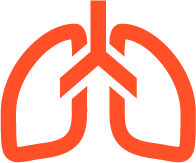Pulmonary Function Lab
Lung Function Testing
What
Pulmonary function tests, or PFTs, measure how well your lungs work. They include tests that measure lung size and air flow, such as spirometry and lung volume tests. Other tests measure how well gases such as oxygen get in and out of your blood.
A plethysmograph is an instrument for measuring changes in volume within an organ or whole body (usually resulting from fluctuations in the amount of blood or air it contains).
How
Spirometry
Your PFTs may include spirometry, which measures the amount of air you breathe in and out. For this test, you’ll sit in front of a machine and be fitted with a mouthpiece. It’s important that the mouthpiece fits snugly so that all the air you breathe goes into the machine. You’ll also wear a nose clip to keep you from breathing air out through your nose. The respiratory technologist will explain how to breathe for the test.
You may then breathe normally. Your doctor will ask you to breathe in and out as deeply or as quickly as you can for several seconds. They may also ask you to breathe in a medication that opens your airways. You’ll then breathe into the machine again to see if the medication affected your lung function.
Plethysmography test
A plethysmography test measures the volume of gas in your lungs, known as lung volume. For this test, you’ll sit or stand in a small booth and breathe into a mouthpiece. Your doctor can learn about your lung volume by measuring the pressure in the booth.
Diffusion capacity test
This test evaluates how well the small air sacks inside the lungs, called alveoli, work. For this part of a pulmonary function test, you will be asked to breathe in certain gases such as oxygen, helium, or carbon dioxide.
You may also breathe in a “tracer gas” for one breath. The machine can detect when you breathe out this gas. This tests how well your lungs are able to transfer oxygen and carbon dioxide to and from your bloodstream.
Details
How to Prepare for a PFT
Get A Good Night of Sleep
Bring a list of all medications you are taking
Relax, breathe easy and do your best!
Don't eat a heavy meal right before the test
Avoid caffeinated food and drinks before the test
Do not smoke 6 hours before the test
PFTs can help diagnose:
Asthma
Chronic Bronchitis
Respiratory Infections
Lung Fibrosis
Bronchiectasis
Weakness of Chest wall Muscles
Why?
Your doctor will order these tests to determine how your lungs are working. If you already have a condition that’s affecting your lungs, your doctor may order this test to see if the condition is progressing or how it’s responding to treatment.



